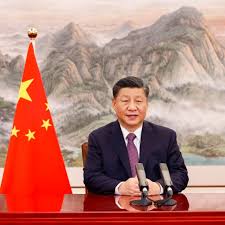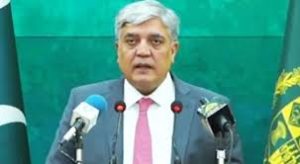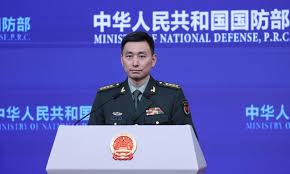Xi chairs symposium on boosting development of China’s western region in new era

Chongqing: Chinese President Xi Jinping presided over a symposium in Chongqing and delivered an important speech on promoting the development of the western region in the new era.
Xi, also general secretary of the Communist Party of China (CPC) Central Committee and chairman of the Central Military Commission, stressed that the western region plays a crucial role in the overall picture of national reform, development, and stability. It is necessary to consistently implement the policies and measures of the CPC Central Committee to promote the development of the western region, further forming a new pattern of greater protection, openness, and high-quality development, enhancing the overall strength and sustainable development capability of the region, and striving to write a new chapter in the development of the region in the process of China’s modernization.
Li Qiang, premier, Cai Qi, director of the General Office of the CPC Central Committee, and Ding Xuexiang, vice premier, attended the symposium. They are all members of the Standing Committee of the Political Bureau of the CPC Central Committee.
Zheng Shanjie, head of the National Development and Reform Commission, and Yuan Jiajun, Wang Xiaohui, Zhao Yide, and Ma Xingrui, Party secretaries of Chongqing Municipality, Sichuan Province, Shaanxi Province, and Xinjiang Uygur Autonomous Region, spoke successively at the symposium, reporting on the progress in promoting the development of the western region and putting forward suggestions and opinions. Leading officials from other provincial regions and Xinjiang Production and Construction Corps attending the symposium submitted written speeches.
After listening to all the speeches, Xi delivered an important address. He pointed out that over the past five years since the CPC Central Committee made arrangements for pursuing further progress in the development of the western region in the new era, the western region has seen significant achievements on eco-environmental conservation and restoration, enhanced capability in carrying out high-quality development, quickened pace in building an open economy, as well as greatly improved infrastructure and steadily raised living standards of the people. It has also won victory in the battle against poverty as scheduled, and joined other regions in achieving the building of a moderately prosperous society in all respects and embarking on a new journey toward building a modern socialist country in all respects, Xi said. He also noted that there are still many difficulties and challenges to overcome for the region’s further development. They need to be seriously studied.
Developing industries that leverage local strengths should be the main focus, he said, adding that efforts are needed to adopt a region-specific approach in nurturing emerging industries and expediting industrial transformation and upgrade in the western region. Xi highlighted the imperative to strengthen integration between innovation in science and technology and that in industries, actively train and introduce high-caliber sci-tech talents, and put them to best use, and strive for breakthroughs in a batch of core technologies in key fields. Efforts are needed to deepen the sci-tech cooperation between the central and eastern China and western China and achieve better results in building national innovation demonstration areas and demonstration zones for the transfer and commercialization of sci-tech innovation results. Measures should also be taken to speed up technological innovation of traditional industries, advance equipment renewals in major industries, and promote traditional industries with competitive edges to upgrade, improve the efficiency of their production and quality of their products, to boost the comprehensive utilization efficiency of resources and the fine and deep processing levels of products. Xi stressed the need to promote the integrated development between the centrally-administered enterprises and the western region, and build service industries such as tourism into pillar ones. He also urged efforts to adopt a region-specific approach when developing new quality productive forces, explore the development of modern manufacturing and strategic emerging industries, and make deployment for the building of future-oriented industries, so as to form new growth drivers in the region.
Xi noted that high-quality development must be supported by high-level protection to consolidate the national ecological security barrier. Efforts should be made to optimize the framework of territorial space development and protection, enhance region-specific management and control of the ecological environment, and accelerate the advancement of major projects for the conservation and restoration of key ecosystems. This will help win the three iconic battles of the Three-North Shelterbelt Forest Program. It is imperative to strengthen the conservation of ecological resources, improve the capacity in preventing and controlling forest and grassland fires, as well as enhancing pollution prevention and control in key regions and fields. He underscored the efforts to further promote the transformation of energy conservation and carbon reduction in traditional industries to facilitate the clean and efficient utilization of coal in an orderly manner. It is important to improve the mechanism for realizing the market value of ecosystem goods and services, as well as the horizontal compensation mechanism for ecological conservation.
Xi underlined efforts to boost large-scale development through large-scale opening-up and facilitate opening up of the western region to the domestic and international markets. Measures should be taken to vigorously advance the construction of the New International Land-Sea Trade Corridor, promote development and opening-up along the route, and deeply integrate into the development of the Belt and Road. He underscored the need of improving the layout of different industrial parks, border economic cooperation zones, and cross-border economic cooperation zones, as well as promoting the high-quality development of pilot free trade zones. It is essential to steadily expand institutional opening up and build a market-oriented, law-based and internationalized business environment. Efforts should also be made to serve and align with regional major strategic initiatives, actively integrate into the building of a unified national market, innovate the connection mechanism for inclusive platforms in the eastern, central and western regions, as well as deepen pragmatic cooperation with the eastern, central and northeastern regions.
Xi noted the necessity of ensuring both development and security, and improving the security guarantee capacity in key areas such as energy and resources. He urged the region to accelerate the development of a new energy sector, and expand and strengthen a number of key national energy bases. It is imperative to strengthen the interconnection of pipeline networks, and improve the capacity of “west-to-east power transmission.” It is important to strengthen planning, control and management of mineral resources, and their large-scale intensive development and utilization, so as to accelerate the formation of a batch of national bases for the mining and processing of mineral resources. He urged efforts to improve the security of water resources, and noted the need for the region to innovate industrial cooperation with other regions, and optimize the industrial layout mechanism so as to receive industries transferred gradually from other regions in an orderly manner. It is essential to promote the development of the Chengdu-Chongqing Economic Circle, actively foster city clusters, develop and expand a number of provincial sub-central cities, and promote infrastructure connectivity and the sharing of public service among cities.
Xi noted the importance of integration between new-type urbanization and comprehensive rural revitalization, so as to ensure and improve people’s well-being in the process of development. It is imperative to thoroughly implement the rural revitalization strategy, increase support to key counties for rural revitalization, establish a regular mechanism for providing assistance to low-income people and underdeveloped areas, and make sure that no large number of people become poverty-stricken again. He noted the need to learn from and apply the experience from the Green Rural Revival Program to create a rural development model with regional characteristics. Xi said county economies with distinctive characteristics should be developed, and a batch of counties strong in agricultural, industrial and tourism sectors should be fostered, so as to ensure that farmers have job opportunities near their hometown and that their income increase, and urbanization be advanced according to local conditions. The region was urged to develop more high-standard cropland, and shoulder the responsibility of ensuring stable production and supply of major agricultural products, so as to make due contributions to national food security. Greater efforts are also needed to promote cultural and ethical advancement, transform outdated rural customs, and actively cultivate new trends and new customs for our times. The community-level governance system led by Party organizations should be optimized, and the “Fengqiao Model” in the new era should be adhered to and developed. Organized crime should be consistently combated and rooted out to ensure people’s safety and stability at the primary level.
Xi noted that a strong sense of community for the Chinese nation should be forged to safeguard ethnic unity and stability in border areas. Areas with large ethnic minority populations should carry out the requirements for fostering a strong sense of community for the Chinese nation in the whole process and in all aspects of social and economic development. The region is urged to promote social and economic development with enough concern for people’s well-being, improve the social security system, ensure the basic livelihoods of the people, and resolutely address the pressing concerns of the people. It is imperative to implement the Party’s ethnic policies in full, speed up building an interconnected social structure and community environment, and promote communication, exchanges and integration among people from different ethnic groups, Xi said. It is essential to stick to the Party’s basic policy on religious affairs, remain committed to the principle that religions in China must be Chinese in orientation, and continue to crack down on illegal religious activities. Further efforts should be made to boost local economies and raise local living standards in border areas in the new era, building more infrastructure and public service facilities, and developing sectors such as tourism along the border areas, so as to ensure that border residents enjoy a rich life, and border areas enjoy a beautiful scenery alongside with security and solid defense.
Last but not least, Xi stressed that the Central Leading Group for Coordinated Regional Development must strengthen the overall coordination, supervision and inspection, and relevant departments in the central government must put forth targeted policies and measures through studies. Local Party committees and governments at all levels in the western region must shoulder principal responsibilities and promote the implementation of the decisions and plans of the CPC Central Committee. He urged efforts to improve the collaboration mechanism between the eastern and western regions and deepen paired assistance programs. What has been achieved in the theoretical study program should be consolidated, and education on Party discipline should be carried out well. It is also imperative to persistently rectify pointless formalities to reduce burden on grass-roots units. Efforts should also be made to improve the decision-making mechanism, conduct full discussion and risk assessment before the introduction of major policies, especially those related to people’s livelihood, and promptly investigate into and decisively tackle problems in the implementation of those policies, he said. It is imperative to cultivate a contingent of high-caliber and professional officials who are loyal to the Party, have moral integrity and demonstrate a keen sense of responsibility, establish and optimize systems for evaluation and motivation, care for officials working at the grassroots, especially those working in areas with harsh conditions, and motivate them to boldly break new ground and take on responsibilities.
In his speech, Premier Li Qiang urged relevant departments and governments in the western region to conscientiously study and understand as well as put into practice the gist of General Secretary Xi Jinping’s important speech. While the development of the western region should be planned and promoted from a larger picture of the Chinese modernization, it is equally important that targeted measures should be adopted in light of different local conditions and development potentials and in a region-specific and category-based manner. Li said full play should be given to regional characteristics and strengths, fostering more growth engines and growth belts that promote regional development, building a solid national eco-environmental security barrier, enhancing the development capabilities of areas of special types, and coordinating resolution of local government debt risks and stable development. He urged efforts to expand opening up to the domestic and international markets, proactively align strategies of the western region with those of other regions, actively integrate into international economic flow, and enhance the dynamics and vitality of the western region development.
In his speech, Ding Xuexiang called for efforts to conscientiously study and put into practice the gist of General Secretary Xi Jinping’s important speech, faithfully, accurately and comprehensively implement the new development philosophy, and coordinate high-quality development and high-standard protection, so as to make constant progress in the development of the western region. He urged the region to fulfill the important mission of safeguarding the country’s ecological security, enhance ecological conservation and restoration, and upgrade the diversity, stability and sustainability of ecosystem. He demanded continuous steps to further the fight against pollution with targeted and science-based approaches in accordance with the law, so as to further improve the region’s ecology and the environment. He also called for action to accelerate the green and low-carbon transformation of economic growth, develop new quality productive forces in a region-specific manner, and actively yet prudently work towards carbon peaking and carbon neutrality.
Li Ganjie, He Lifeng, Wu Zhenglong, Mu Hong and Jiang Xinzhi attended the meeting. Also present were leading officials of relevant central Party and government departments, leading officials of relevant local government departments and those in charge from relevant enterprises.





